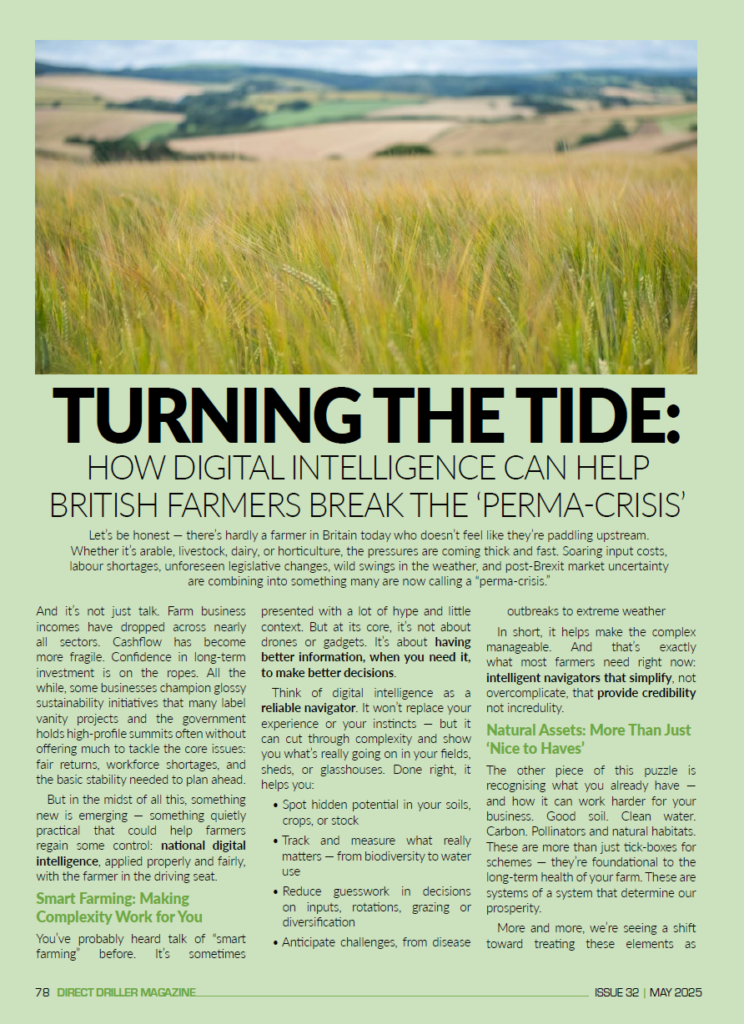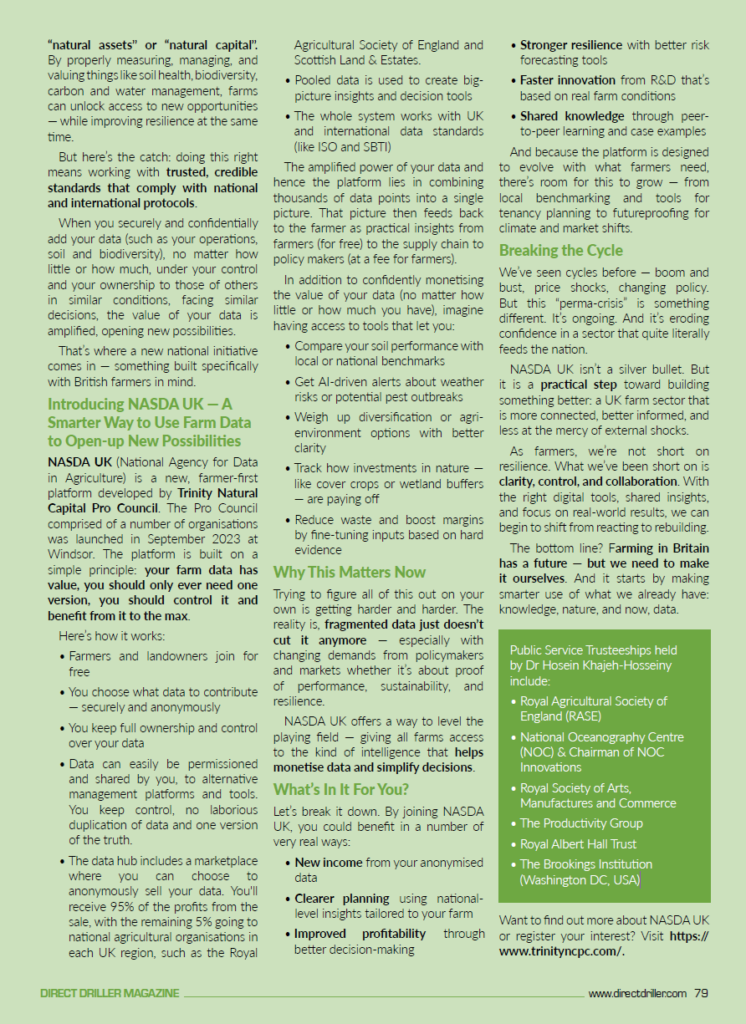Let’s be honest — there’s hardly a farmer in Britain today who doesn’t feel like they’re paddling upstream. Whether it’s arable, livestock, dairy, or horticulture, the pressures are coming thick and fast. Soaring input costs, labour shortages, unforeseen legislative changes, wild swings in the weather, and post-Brexit market uncertainty are combining into something many are now calling a “perma-crisis.”
And it’s not just talk. Farm business incomes have dropped across nearly all sectors. Cashflow has become more fragile. Confidence in long-term investment is on the ropes. All the while, some businesses champion glossy sustainability initiatives that many label vanity projects and the government holds high-profile summits often without offering much to tackle the core issues: fair returns, workforce shortages, and the basic stability needed to plan ahead.
But in the midst of all this, something new is emerging — something quietly practical that could help farmers regain some control: national digital intelligence, applied properly and fairly, with the farmer in the driving seat.
Smart Farming: Making Complexity Work for You
You’ve probably heard talk of “smart farming” before. It’s sometimes presented with a lot of hype and little context. But at its core, it’s not about drones or gadgets. It’s about having better information, when you need it, to make better decisions.
Think of digital intelligence as a reliable navigator. It won’t replace your experience or your instincts — but it can cut through complexity and show you what’s really going on in your fields, sheds, or glasshouses. Done right, it helps you:
- Spot hidden potential in your soils, crops, or stock
- Track and measure what really matters — from biodiversity to water use
- Reduce guesswork in decisions on inputs, rotations, grazing or diversification
- Anticipate challenges, from disease outbreaks to extreme weather
In short, it helps make the complex manageable. And that’s exactly what most farmers need right now: intelligent navigators that simplify, not overcomplicate, that provide credibility not incredulity.
Natural Assets: More Than Just ‘Nice to Haves’
The other piece of this puzzle is recognising what you already have — and how it can work harder for your business. Good soil. Clean water. Carbon. Pollinators and natural habitats. These are more than just tick-boxes for schemes — they’re foundational to the long-term health of your farm. These are systems of a system that determine our prosperity.
More and more, we’re seeing a shift toward treating these elements as “natural assets” or “natural capital”. By properly measuring, managing, and valuing things like soil health, biodiversity, carbon and water management, farms can unlock access to new opportunities — while improving resilience at the same time.
But here’s the catch: doing this right means working with trusted, credible standards that comply with national and international protocols.
When you securely and confidentially add your data (such as your operations, soil and biodiversity), no matter how little or how much, under your control and your ownership to those of others in similar conditions, facing similar decisions, the value of your data is amplified, opening new possibilities.
That’s where a new national initiative comes in — something built specifically with British farmers in mind.
Introducing NASDA UK — A Smarter Way to Use Farm Data to Open-up New Possibilities
NASDA UK (National Agency for Data in Agriculture) is a new, farmer-first platform developed by Trinity Natural Capital Pro Council. The Pro Council comprised of a number of organisations was launched in September 2023 at Windsor. The platform is built on a simple principle: your farm data has value, you should only ever need one version, you should control it and benefit from it to the max.
Here’s how it works:
- Farmers and landowners join for free
- You choose what data to contribute — securely and anonymously
- You keep full ownership and control over your data
- Data can easily be permissioned and shared by you, to alternative management platforms and tools. You keep control, no laborious duplication of data and one version of the truth.
- The data hub includes a marketplace where you can choose to anonymously sell your data. You’ll receive 95% of the profits from the sale, with the remaining 5% going to national agricultural organisations in each UK region, such as the Royal Agricultural Society of England and Scottish Land & Estates.
- Pooled data is used to create big-picture insights and decision tools
- The whole system works with UK and international data standards (like ISO and SBTI)
The amplified power of your data and hence the platform lies in combining thousands of data points into a single picture. That picture then feeds back to the farmer as practical insights from farmers (for free) to the supply chain to policy makers (at a fee for farmers).
In addition to confidently monetising the value of your data (no matter how little or how much you have), imagine having access to tools that let you:
- Compare your soil performance with local or national benchmarks
- Get AI-driven alerts about weather risks or potential pest outbreaks
- Weigh up diversification or agri-environment options with better clarity
- Track how investments in nature — like cover crops or wetland buffers — are paying off
- Reduce waste and boost margins by fine-tuning inputs based on hard evidence
Why This Matters Now
Trying to figure all of this out on your own is getting harder and harder. The reality is, fragmented data just doesn’t cut it anymore — especially with changing demands from policymakers and markets whether it’s about proof of performance, sustainability, and resilience.
NASDA UK offers a way to level the playing field — giving all farms access to the kind of intelligence that helps monetise data and simplify decisions.
What’s In It For You?
Let’s break it down. By joining NASDA UK, you could benefit in a number of very real ways:
- New income from your anonymised data
- Clearer planning using national-level insights tailored to your farm
- Improved profitability through better decision-making
- Stronger resilience with better risk forecasting tools
- Faster innovation from R&D that’s based on real farm conditions
- Shared knowledge through peer-to-peer learning and case examples
And because the platform is designed to evolve with what farmers need, there’s room for this to grow — from local benchmarking and tools for tenancy planning to futureproofing for climate and market shifts.
Breaking the Cycle
We’ve seen cycles before — boom and bust, price shocks, changing policy. But this “perma-crisis” is something different. It’s ongoing. And it’s eroding confidence in a sector that quite literally feeds the nation.
NASDA UK isn’t a silver bullet. But it is a practical step toward building something better: a UK farm sector that is more connected, better informed, and less at the mercy of external shocks.
As farmers, we’re not short on resilience. What we’ve been short on is clarity, control, and collaboration. With the right digital tools, shared insights, and focus on real-world results, we can begin to shift from reacting to rebuilding.
The bottom line? Farming in Britain has a future — but we need to make it ourselves. And it starts by making smarter use of what we already have: knowledge, nature, and now, data.
Want to find out more about NASDA UK or register your interest? Visit https://www.trinityncpc.com/.
Public Service Trusteeships held by Dr Hosein Khajeh-Hosseiny include:
- Royal Agricultural Society of England (RASE)
- National Oceanography Centre (NOC) & Chairman of NOC nnovations
- Royal Society of Arts, Manufactures and Commerce
- The Productivity Group
- Royal Albert Hall Trust
- The Brookings Institution (Washington DC, USA)



